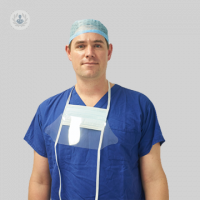The consequences of leaving plantar fasciitis untreated
Written in association with:Plantar fasciitis is an inflammatory condition of the fibrous tissues on the bottom of your foot that connect your heel bone to your toes. It can result in intense pain and discomfort, usually under the heel and around the arch.
We spoke to Mr Edward Dawe, a specialist in foot and ankle surgery based in Chichester and Worthing, to understand more about plantar fasciitis, how long it lasts, how to treat it, and what can happen if you leave it untreated.

How long does plantar fasciitis normally take to heal?
Plantar fasciitis usually resolves on its own but can be very painful. It can take up to two years to resolve in most circumstances. There is a small subset of people who have the condition very severely, who can have plantar fasciitis in the longer term, for many years.
What happens if plantar fasciitis isn't going away?
There are a number of other conditions which can mimic the symptoms of plantar fasciitis. If you have any concerns, or if you are suffering severe pain then you should seek treatment. This will usually involve scanning and/or X-rays of the heel to confirm the diagnosis.
What happens if I leave it untreated?
In most cases, if you leave plantar fasciitis untreated it will resolve on its own. However, some people will have severe pain meaning they need early treatment. Others may have heel pain from other causes such as a stress fracture in the calcaneum (heel bone) or nerve entrapment.
What does it mean if the pain is getting worse?
If the pain is getting worse, this may mean that the plantar fasciitis is getting worse. However, this could also be a sign that your heel pain is coming from a different cause. If the pain is worsening you should seek help to establish the correct diagnosis before proceeding further.
When should I see a doctor?
If you are struggling with heel pain then there is no need to wait as often some simple measures can help through your doctor. Similarly, if you have had your symptoms for six weeks or so and they are not improving you should see your doctor.
If your foot is swelling or going red you should definitely seek treatment.
What treatment do I need for this?
There are many different ways of treating plantar fasciitis, but most cases can be managed without invasive treatment. This is by a combination of stretching exercises, changes to your footwear and shockwave therapy. Only a small proportion of patients ultimately come for surgery.
Shockwave therapy is a type of pulsed soundwave which I use at the Oving Clinic. This can be done at any stage in the disease process and improves things for a majority of patients. Steroid injections carry a risk of plantar fascia rupture and I tend to avoid them for plantar fasciitis.
For severe cases, there are surgeries, of which the most commonly performed in my practice is the proximal medial gastrocnemius release. This is a day-case procedure under local anaesthetic which has a rapid recovery. You can walk on your foot immediately and there is very little restriction on your activity afterwards.
Plantar fasciitis resolves rapidly in the majority but can be long-term and severe for a small proportion of people. In this group, getting the right input from a foot and ankle specialist can be invaluable.
Mr Edward Dawe is a specialist foot and ankle surgeon in Chichester and Worthing. To book a consultation with him, go to his Top Doctors profile and check his availability.


